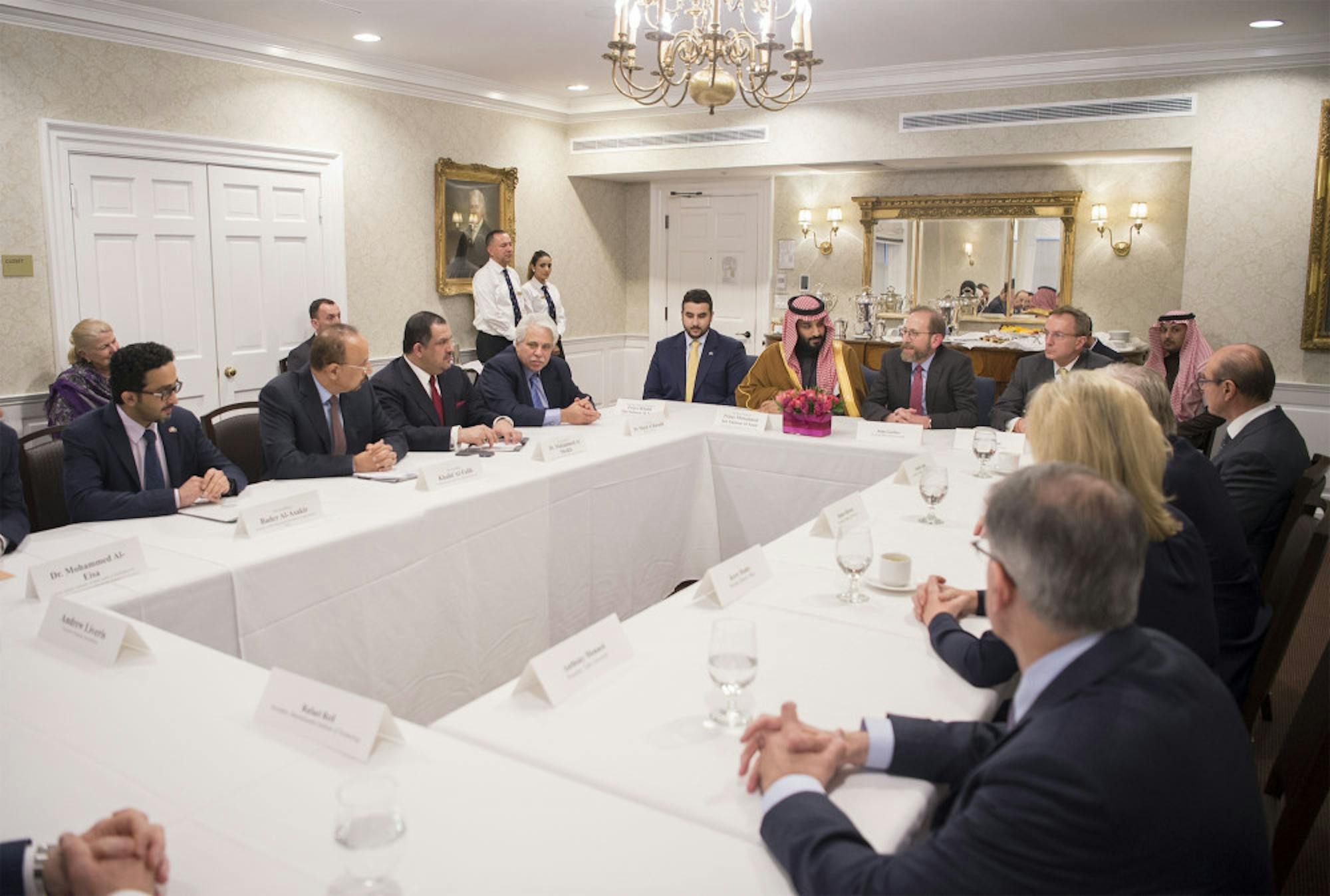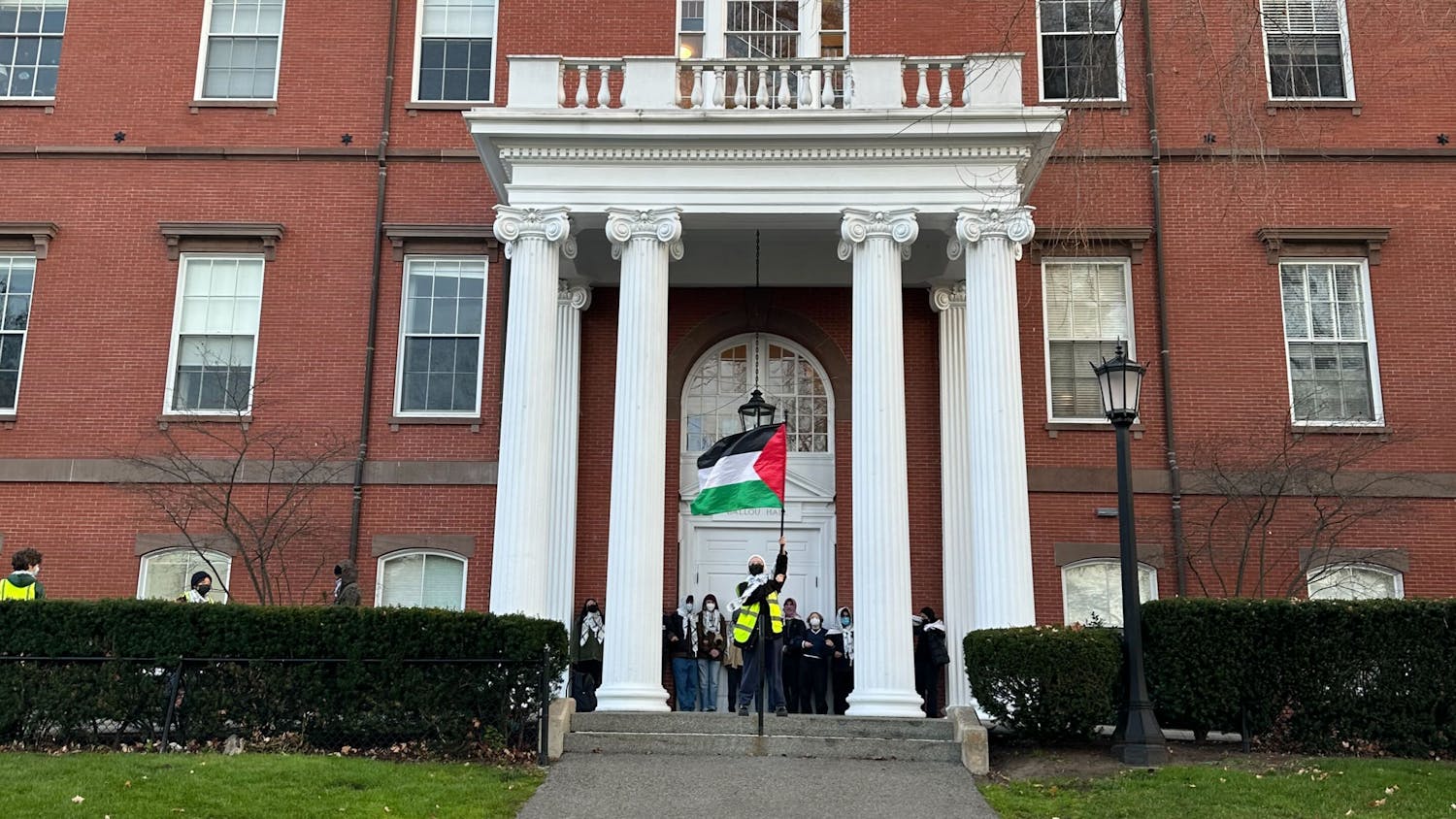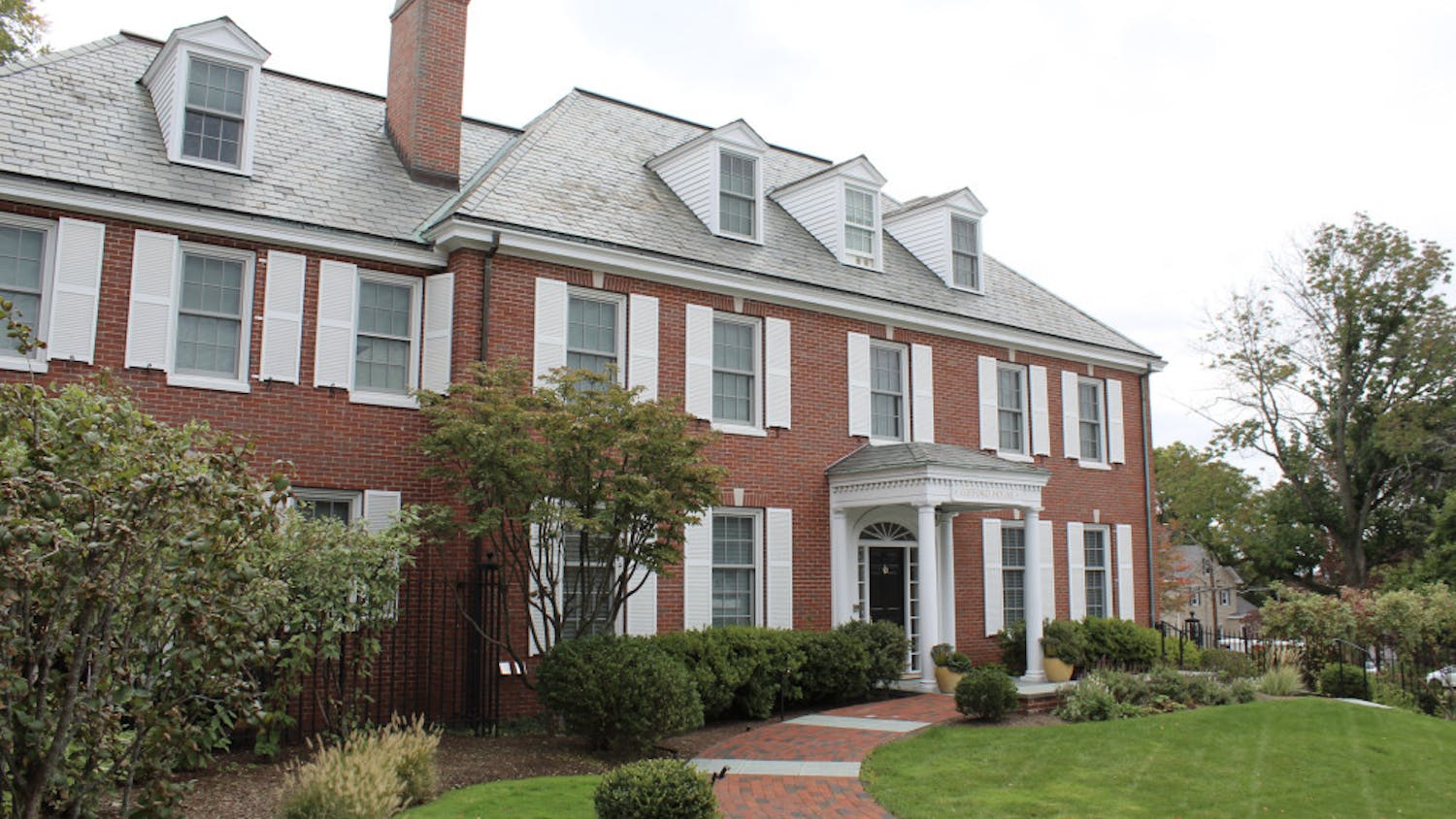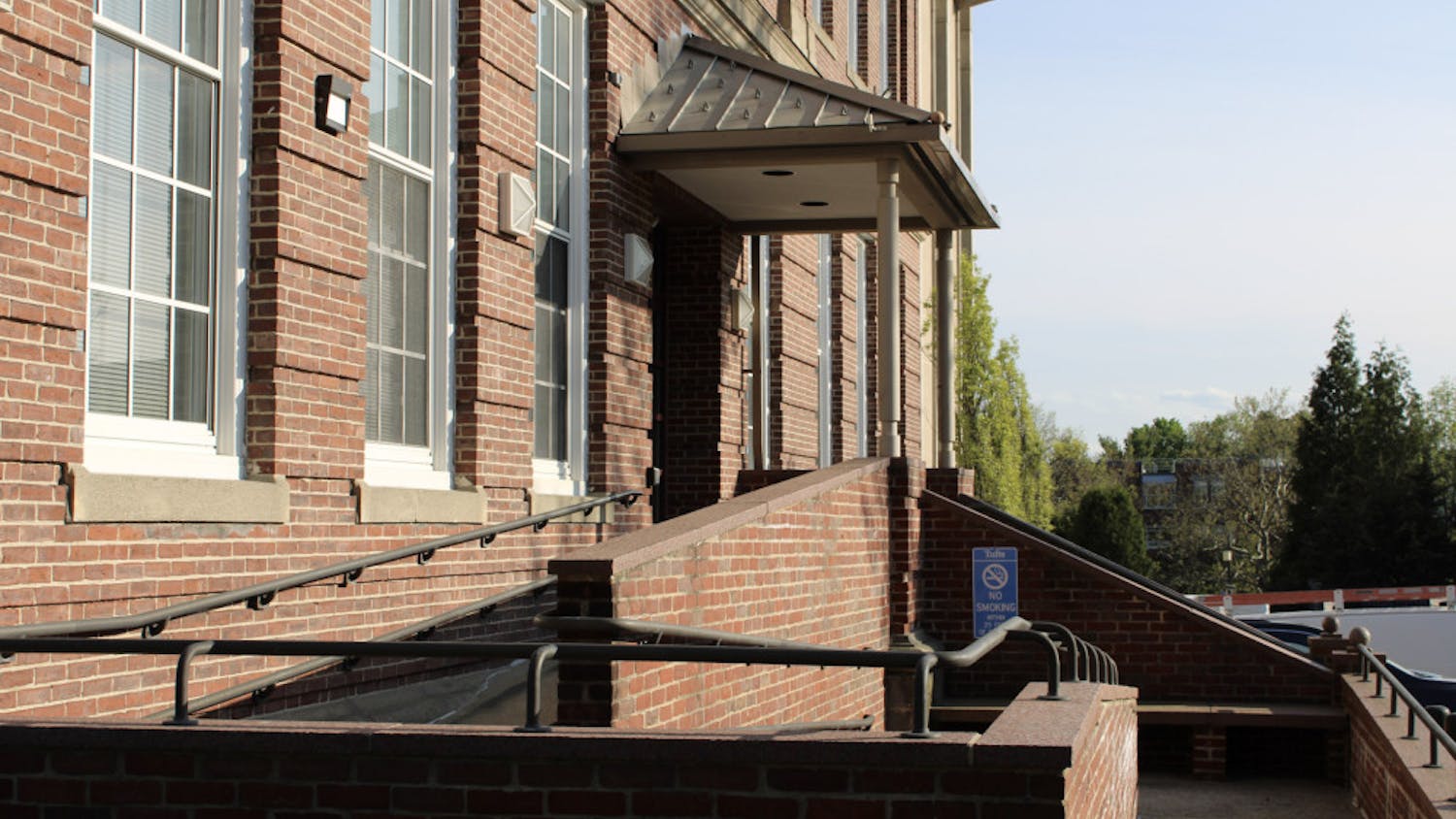University President Anthony Monaco and leaders from fiveother Boston-area colleges and universities met with Mohammed bin Salman, the crown prince of Saudi Arabia, whose human rights record has sparked widespread controversy, on March 25, 2018. Tufts did not disclose the meeting at the time.
The meeting, heldat the Harvard Faculty Club, was hosted by Harvard University Provost Alan M. Garber, Tufts Executive Director of Public Relations Patrick Collins confirmed.
The other attendees at the meeting were then-Babson College President Kerry Healey, Boston University President Robert A. Brown, Massachusetts Institute of Technology (MIT) President L. Rafael Reif and Northeastern University President Joseph E. Aoun. Harvard was represented by Garber, per a Saudi Press Agency news release published the day of the meeting on the website of the Riyadh Daily, the English edition of a Saudi pro-government newspaper, Al-Riyadh.
Collins told the Daily in an email that Monaco meets routinely with foreign dignitaries and academics and that the discussion with bin Salman centered on higher education and technology's role in the classroom. He did not offer details on Monaco’s contribution to the exchange.
In a Harvard Crimson article that did not report Monaco's presence at the meeting, Harvard Vice Provost of International Affairs Mark C. Elliott noted that bin Salman was particularly interested in economic catalysts such as research, entrepreneurship and innovation.
“[Bin Salman] really spent 90 percent of the time simply listening and making polite but limited responses to what he was hearing,” Elliott said in the Crimson article.
The Saudi news release diverged slightly from the accounts offered by the universities.
"During the meeting, [the attendees] reviewed the areas of cooperation between the Kingdom of Saudi Arabia and the educational institutions in Boston in the scientific and research aspects in order to deepen partnership with the US educational institutions in Boston," the release states.
Indeed, that partnership already runs deep.
In total, Tufts, Babson, Boston University and MIT have received, or have been pledged, at least $122.3 million in financing from the Saudi government, Saudi state-owned industries and Saudi public universities since 2012, according to a review of federal data by the Daily as well as reporting by the Associated Press and the Boston Globe.
Harvard does not report the identities of its Saudi donors to the federal government but has received $30.6 million from sources in the kingdom since 2012, according to federal data.
Northeastern is the only school represented at the March 2018 meeting that has reported no Saudi donations since 2012.
A Tufts Daily investigation in May revealed that the university has received over $59.5 million in Saudi financing since 2009, primarily through government-sponsored tuition payments for Saudi students at the Tufts University School of Medicine.
Collins said in the email that the School of Medicine's engagement with "Saudi students, faculty, researchers and institutions, which have provided Saudi students with access to education, training and research experience in healthcare and the life sciences," played no role in Monaco's attendance at the meeting.
Collins said last semester that Tufts was “intensifying” its review process for donations from Saudi Arabia in the wake of Washington Post columnist Jamal Khashoggi's brutal murder.Tufts' new executive vice president, Michael Howard, confirmed changes to the review process in a September interview with the Daily.
Monaco's meeting with bin Salman, the de facto head of state of a G20 nation, was not mentioned on the university's website, social media accounts or Tufts Now, nor did Monaco mention it on any of his personal social media.
In contrast, Monaco’s interactions with Speaker of the House Nancy Pelosi in May, Singapore Ambassador Ashok Mirpuri in 2018, then-Secretary of State John Kerry in 2016 and Spain's King Felipe VI in 2015 were all promoted on social media.
Collins explained the university's lack of publicity for the March 2018 meeting with bin Salman, writing that the host institution is typically responsible for media coverage of events.
Harvard’s social media accounts did not disclose who attended events with bin Salman. Monaco’s attendance was noted passingly in the Saudi Press Agency news release, and the kingdom's embassy in Washington, D.C., tweeted a photo the following day showing Monaco at the meeting.
Monaco’s attendance at the meeting has not been previously reported by U.S. media.
A little more than a month after Monaco met with bin Salman at Harvard, leading humanitarian experts gathered at the World Peace Foundation’s May 4 conference, “The Return of Famine,” held at Tufts' Fletcher School of Law and Diplomacy. The day closed with a panel on the current crisis in Yemen.
During the panel,Martha Mundy, professor emeritus of anthropology at the London School of Economics, laid out her empirical case that Saudi Arabia has intentionally targeted Yemeni agriculture, fishing, ports and water treatment facilities in an attempt to wield starvation as a weapon of war, according to Alex de Waal, executive director of the World Peace Foundation at the Fletcher School.
These tactics amount to war crimes, Mundy concluded in a report published by the World Peace Foundation in October 2018.
The air campaign that bin Salman has directed against the Houthi rebels in Yemen has not only sparked famine but has also caused6,800 civilian deaths and fueled the worst cholera outbreak in decades, according to human rights organizations.
“He has a case to answer in international court for having been responsible for planning and orchestrating war crimes, including crimes of starvation against the Yemeni people,” de Waal, a human rights expert who has done extensive work in Rwanda and Darfur, said.
De Waal added that this was as true in March 2018, when Monaco met with bin Salman, as it is now.
Bin Salman has also exhibited blatant disregard for human and civil rights in Saudi Arabia, imprisoning political rivals in a hotel in 2017, arresting women who petitioned for the right to drive and who were then tortured while in confinement in 2018, and executing 37 members of the country's minority Shi'ite community by beheading after kangaroo trials this spring. On top of that, a June 2019 investigation by the United Nations concluded bin Salman was responsible for the killing of Jamal Khashoggi.
At the time of the Harvard roundtable, bin Salman was on tour in the U.S., trying to shake his unsavory reputation. He made stops in New York, Washington, D.C., Boston, Silicon Valley and Texas, meeting with public figures including Oprah Winfrey and Jeff Bezos along the way, according to the New York Times. The trip was widely viewed as part of a public relations campaign to improve the conservative autocracy’s image in the West.
De Waal, who has met with Omar al-Bashir, the recently ousted Sudanese dictator indicted for war crimes, to discuss human rights, said he was not necessarily opposed to Monaco's meeting with bin Salman. He said that discussing scholarships for Saudi medical students with the crown prince is justifiable.
De Waal cited 1997 U.S. sanctions that prevented educational exchange between the U.S. and Sudan, which he says pushed the latter country further toward its authoritarian allies. However, he said the meeting still put Monaco in a “tricky position” since it came during bin Salman’s charm offensive in the U.S.
“It’s not as though President Monaco has gone out of his way to praise the Saudi crown prince, so I think a meeting that has the agenda of making sure that educational exchanges and cooperation ... are expanded, I think that’s fine," de Waal said. "I would not want that to be in any way used to burnish the image or legitimacy of the crown prince."
But for others, including Michael VanElzakker, a board member of the human rights advocacy group Massachusetts Peace Action and a part-time psychology lecturer at Tufts, that is exactly what the meeting did.
“Because [bin Salman] is trying to portray himself as a modern reformist leader, he wants to meet with elite academic institutions as a form of credibility,” he said.
VanElzakker, who has called for Tufts to stop accepting money from Saudi government sources, argued that the meeting showed the ways in which Saudi payments to Tufts and other universities are compromising.
“It really shows an ability to ignore something terrible if there’s enough money on the table,” he said.
Monaco is not the only high-ranking Tufts official to have met the crown prince in March 2018.
Just two weeks before the meeting at Harvard, then-Dean of the Fletcher School of Law and Diplomacy James G. Stavridis was in Riyadh for a Saudi-sponsored tête-à-tête with Adel al-Jubeir, Saudi Arabia's foreign minister at the time, according to a Saudi Press Agency news release.
Collins confirmed in an email that Stavridis' trip was paid for by the Saudi Foreign Ministry, a fact Stavridis disclosed in a TIME Magazine op-ed published April 7, 2018.
“The trip in spring of 2018 was to explore executive education opportunities with the Saudi Ministry of Education, which did not materialize,” Stavridis told the Daily in an email.
In the TIME op-ed, titled “Saudi Arabia’s Crown Prince Convinced Me He’s a Force to be Reckoned With,”Stavridis claimed he also had a late-night chat with bin Salman in the Saudi Royal Palace.Stavridis painted a relatively rosy portrait of bin Salman in the piece, opening with a soaring quote from Shakespeare’s “Julius Caesar.”
Stavridis wrote that he had met many world leaders in his career in the Navy, NATO and at Fletcher.
“I would put Prince Muhammad near the top of the list in terms of energy, ambition and vision. His youth means a long, long time in power when he becomes King,” he wrote.
In the op-ed, Stavridis expressed confidence that bin Salman could successfully confront a number of geopolitical and social challenges.
He did, however, note some of the human rights concerns associated with the crown prince, briefly highlighting bin Salman’s detention of royal family members and the war in Yemen before concluding that bin Salman’s odds of success as a leader were “better than even.”
De Waal was categorical about the TIME op-ed.
“It made me feel ill,” he said. “The core agenda of the crown prince is one of promoting his own power and the power of the Saudis in a matter that is profoundly corrupt, profoundly militarized and deeply destabilizing.”
VanElzakker also took issue with the op-ed, saying that Stavridis had reduced war crimes in Yemen to “an asterisk in an otherwise exemplary policy in otherwise exemplary leadership.”
He also pointed to the fact that Stavridis' March 2018 trip was funded by the Saudi government.
“We shouldn’t allow the presentation of extravagant gifts and trips to [let us] forget the humanity of oppressed people around the world, and it looks an awful lot like that’s what happened,” VanElzakker said.
De Waal’s key takeaway from the 2018 meetings was that academic freedom cannot be jeopardized by the university’s ties with Saudi Arabia.
“We need to ensure that academic independence, integrity and also the core values of the Tufts community are not endangered by this," de Waal said. "There’s no sign that it has been, but it may be something to monitor, and maybe something to test."
Monaco attended 2018 meeting with Saudi crown prince

University President Anthony Monaco (front right) attends a meeting with Saudi Crown Prince Mohammed bin Salman and leaders from five other Boston-area colleges and universities on March 25, 2018 at Harvard University.





